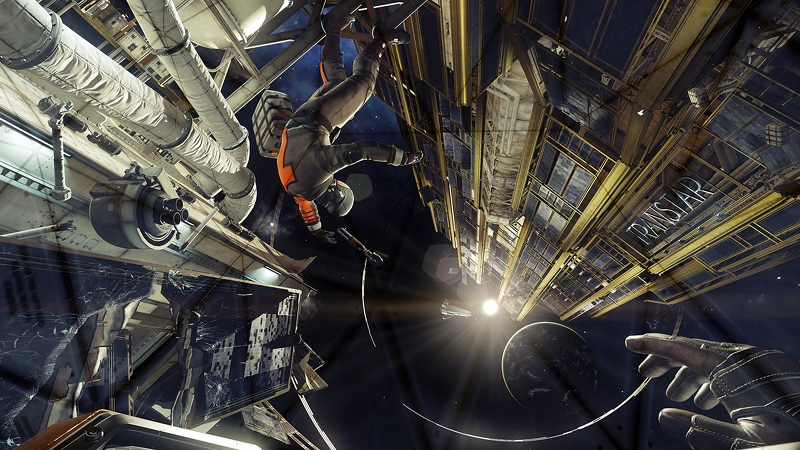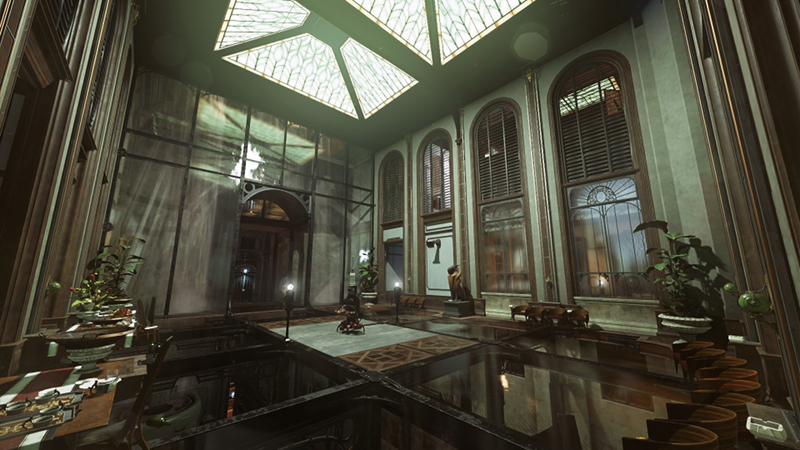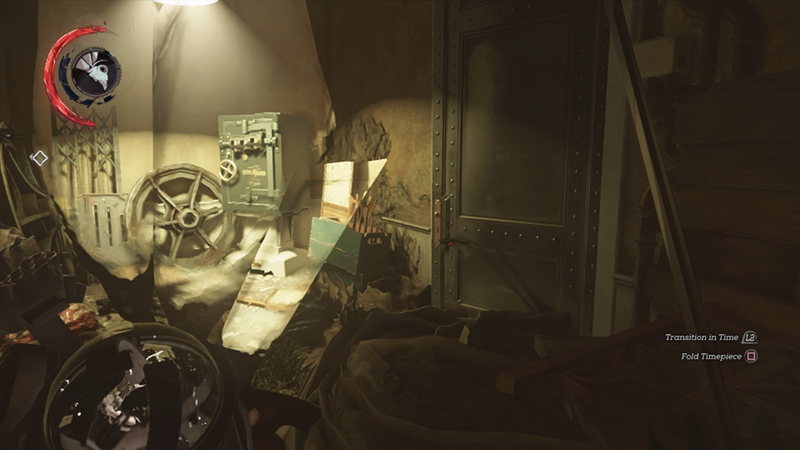Living Prison Arkane Studios
- Transfer
- Recovery mode

Arkane Studios is better known as the developer of "immersive simulations" - worlds, plunging into which - you drown; consisting of intricately intertwined systems tied to exotic abilities that can be manipulated to resolve an existing scenario in any number of ways. But it would be more accurate to describe the creations of the studio, based in Lyon and Austin, as “immersive” simulators - setting the framework from which you are struggling to break out using tools that are not entirely under the control of the designer.
Just look at how they usually start. Today, every Arkane title, with the exception of the licensed spin-off - Dark Messiah of Might and Magic, starts with the player’s character being held in custody - from a dirty prison in the 2002 Arx Fatalis debut project to Emily’s sealed bedroom Dishonored 2. This sets a certain tone, while the games of the Dishonored series provide you with the role of a freedom-loving apostate, like a crazy cell in the body of prudence, but their stories and sandboxes are tarnished with the knowledge that even an unlimited part of the design inevitably takes the form of a trap, edstavlyaya signals and a set of stimuli which is directed imperceptibly player or repel it.
 Arkane's highly acclaimed but poorly selling game called Arx Fatalis was introduced as a sequel to Ultima Underworld, but the studio did not want to give up control of the game to the prospective publisher Electonic Arts.
Arkane's highly acclaimed but poorly selling game called Arx Fatalis was introduced as a sequel to Ultima Underworld, but the studio did not want to give up control of the game to the prospective publisher Electonic Arts.
The streets of Danwall and Karnak are able to reward curiosity in various ways that Call of Duty never possessed, but these paths are still a pile of integrated vectors and scenario solutions: illuminated windows that attract your attention; collectibles that lure you to the mouth of the alleys; villains whose various intrigues are woven into the terrain that is waiting to become excavated far and wide. The real goal of a game like Dishonored 2 is to make a call that informs the developer about the mechanics and variables used to detect certain tactics or access points that Arkane did not expect. This is clearly expressed in the legendary "Mechanical Mansion" - an interactive, laconicly designed composition in which your opponent is, in fact, an evil level designer,
“I think everyone likes to see what's on the other side of the scenery,” says Rafael Colantonio, co-founder and president of Arkane. "People like to go beyond, otherwise it looks like the usual" oh yes, I know what you want from me, a game designer. " You try not to break the game for as long as possible - because playing it becomes sad, but break it the way you want, and in the end you get “oh, the game is still going on, but I’m doing something (which is not planned for the game), I feel I’m special because I’m doing something that wasn’t in the plans "- I think this is a great feeling for the players."
Of course, in many respects, the mechanical mansion is the greatest feat of universal deception - it sells you the fantasy of its liberation and the overthrow of the creator, which, nevertheless, is nothing more than an exquisitely set and controlled part of the design. Extremely disgusting, although he is a sociopath - Kirin Dzhindosh - this is nothing more than a comforting metaphor for the galloping puppeteer, distracting you from the one who really pulls you for the strings. But if Arkane's gilded prisons are unbreakable, they are animated by a radical sensation that is scarcely served by critical praise for “details” or simply by the significant number of options supported by the script.
If games are teaching mechanisms, then Arkane games teach you not to trust your teacher, to overthrow structures supposedly created for help or entertainment. The games in the Dishonored series also tell tales of the abuse of political power, so their levels are a severe test for activist trends, which bring, to put it mildly, much more benefit. It's not just that they destroy the fourth wall, which they forcefully shove into fiction for the sake of sophistication, or that they show you landscapes that contain much more ingenuity than in most other games - but that they reveal to themselves the means for imprisonment, and incite you, with various soft tricks, to break your fetters. I may have gone too far
 The Mechanical Mansion is probably the finest level in Dishonored 2, not least because of the understanding that there is an additional environment at the bottom of the slope to its door.
The Mechanical Mansion is probably the finest level in Dishonored 2, not least because of the understanding that there is an additional environment at the bottom of the slope to its door.
Their design is expensive and, as Liam Neeson would say, a very specific set of skills.
“They are hard to make,” says Colantonio. “They have many invisible values, problems that people would not want to solve. All features are more about fixing a million problems than creating content. If you look at the efforts that are put into the right work when creating things, only if you do not make a game of a different kind, then you should not worry about questions like - what if a player does this? What if the player does something else? ”
“Other games don’t care about it, and they get away with it, so I think this is one of the reasons why people don’t make these games so often, and secondly, I think it's hard to sell them. I do not think that other publishers, other than Bethesda, which really understands us, because it itself was successful in the field of similar games, are capable of this. I remember working with other publishers, and for many of the values that are characteristic of immersive simulators, most publishers answered in the spirit: “Why are you so worried about them? Why does it bother you? What is the value? How will she sell the game? ", Which is why they are so rare."
And it's not just people with big money who do not see the point in immersive simulators. Team members may have some beliefs, even given the addiction to Arkane's previous work.
“You definitely need a special team,” says Colantonio. “You need people who will trust you, because they often ask themselves:“ why should we spend time on such things ”or“ are you sure this is a good idea, ”but then, in the end, they understand.”
“This happened to us during the development of each game - when we attract more people, some of them are really ready for such a game, but most of them are not. Therefore, we must tell them that they are going to do something that sometimes will have to be redone, and sometimes completely thrown away. Some people agree, while others find this sort of thing too complicated. And then, at a certain moment, these people begin to understand what they were actually working on, and when the whole picture develops, they realize why we were doing all this. ”
 Where the "Mechanical Mansion" seems to set your mind against real-time level designer, the "crack in the universe" turns one of the basic concepts of Dishonored - the practice of shaping the fate of any areas. Here, the level is in its final state, and you are asked to rewrite it.
Where the "Mechanical Mansion" seems to set your mind against real-time level designer, the "crack in the universe" turns one of the basic concepts of Dishonored - the practice of shaping the fate of any areas. Here, the level is in its final state, and you are asked to rewrite it.
An integral idea for creating the Arkane game was the ability to grow the player’s abilities without balance, allowing them to deform the structure of the game around themselves - a good example is the Blink ability, which is a short-range teleport that is initially unlocked, but is not the ubiquitous main ability. Also an integral part of game development is knowing when to stop, realizing that a system or tool begins to overload everything else.
“I would say that in every game we had such problems,” comments Colantonio. “I could go back to Dark Messiah in everything, placing ice puddles on the floor, and make people slip on them, which at first would be funny, but then this could create situations in which such a spectacle would look ridiculous. We came across this all the time. ”
“Dishonored is quite an example, you can do a double jump in combination with a teleport, and perhaps, in combination with the ability to jump even higher, you could overcome huge spaces. We actually did not set limits - well, to some extent, we limited the total momentum of the speed of movement, but we left it a high value, because we thought - “why not”? If someone finds a way to access something that we did not plan, it will be great until such actions break the game. ”
Arkane introduced a new generation of the concept of the immersive simulator with the first Dishonored, as they say, surpassing internal expectations by a significant margin, although the sequel seems to have attracted fewer buyers despite enthusiastic reviews. The developer has also become more significant for the parent company ZeniMax, taking Prey license after Zenimax and publisher Bethesda said goodbye to the original developer Human Head.
Rethinking Prey began in 2014 as a new IP, faintly inspired by the Arx Fatalis interconnected dungeon network, it takes effect in 2032, showing you traveling through a retro-futuristic space station flooded with various shapeless aliens, including swift “facial expressions” reminiscent of the headcrabs from Half -Life, which can take the form of inanimate objects. This is a significant twist because it brings Arkane back to a luxurious, evocative, cozy interior that conflicts with its unstable shape - this 60s artificial lampshade that you study can easily turn out to be a facial expression waiting to wrap your legs around your head.
 The gypsum cannon in Prey turns attacking opponents into stone, but can also be used to create platforms and block dangerous areas. Undoubtedly, there are many unknown applications for this gun.
The gypsum cannon in Prey turns attacking opponents into stone, but can also be used to create platforms and block dangerous areas. Undoubtedly, there are many unknown applications for this gun.
“We don’t decide what subject they are looking at, except at the very beginning of the game, because we wanted to introduce the players to the mechanics,” notes Colantonio. “But at some point (in each area), there is an object that can whether to be a facial expression, and if a facial expression fights with you and runs around the corner, then he has a chance to turn into something, so if I play and you play in the same area, then the facial expression cannot turn into one and the same object. "
“We created several points to deceive the player - for example, we put two identical objects somewhere so that the player could think:“ yeah, there are two trash cans, so one of them is a facial expression ”. "We did a few similar things, but most of the time we just leave them at the mercy of the simulation, and let the game do its job."
However, Arkane does not stop there - over time, the player will also receive the ability to transform into objects (into supernatural and funny little things), whose power, like in the case of Blink combinations, inflicts a strong blow to the remaining components of the game.
“For us, it was rather a nightmare, because if you are too small, you can fit into spaces, to possible passage points, to which we do not want to give access. Thus, we got an adjustment that determines how small the subject can be, into which the player can penetrate, and on the contrary, how big the object must be, which we can allow, and we came up with some rules that feel consistent and fair. ”
I checked out the Prey demo shortly after talking with Colantonio, and was immediately overwhelmed with emotions, not least because of the developer’s conflicting allusions to his previous work and game style, which he retained. In one of your emails, you'll find a reference to Looking Glass Studios, behind the creation of the first Ultima and Thief, the cornerstones of the immersive sim genre, which had a huge impact on Colantonio and Arkane co-owner Harvey Smith before they started working together.
I think sending is more than just a joke. In the in-game mail, the message chain applies only to that part of the station, which is essentially a trip to the theme park of fame, positioning the Arkane legacy within the fiction of the new game, which is rather difficult to read, but I will remind you that no matter how generous the simulation in its capabilities is, at heart it’s another “Mechanical Mansion”.
There is also a wrench named after Hephaestus, the Greek god of artisans and craftsmanship, a rather ironic association for a tool that more likely serves as a beating tool. In general, as with the Arkane worlds, there is a cunning provocation; the assumption that you can do much more with what is given to you is immediately striking. Of course, provided that everything is fine with your imagination, but more importantly, if you really want to become free.
